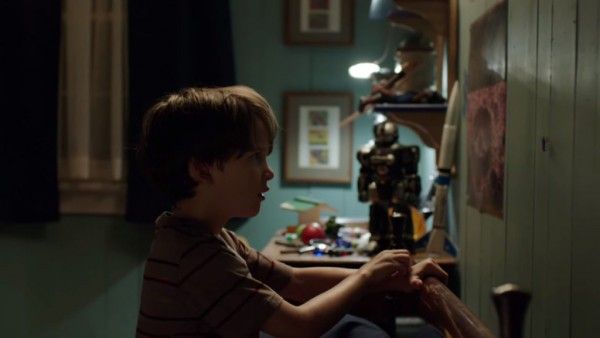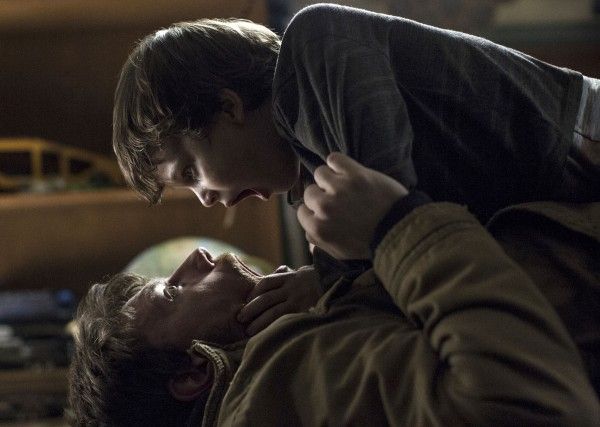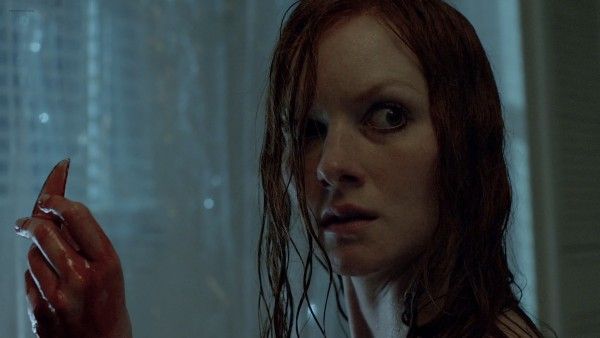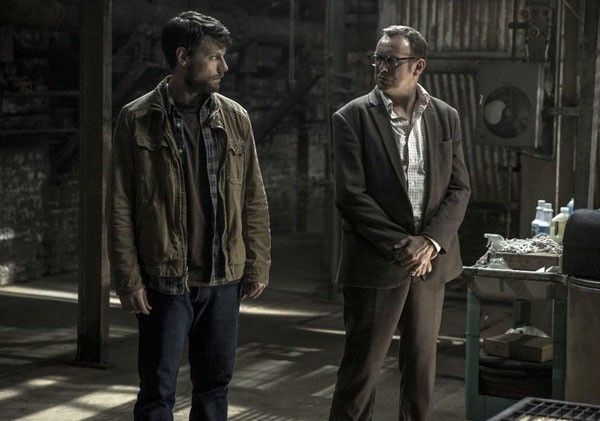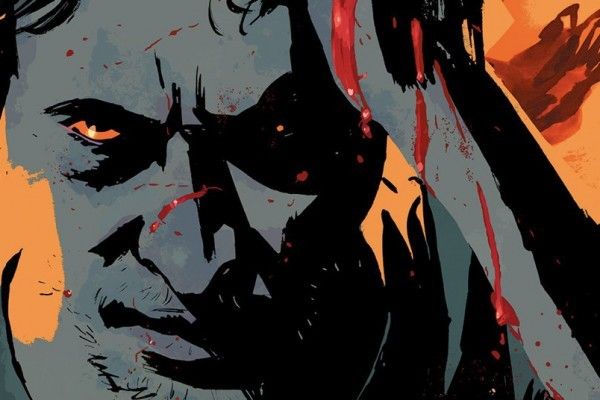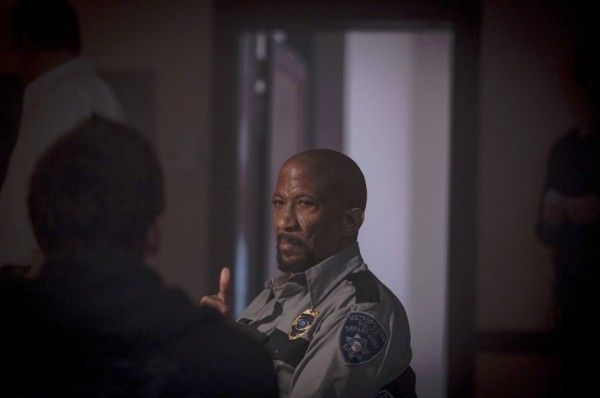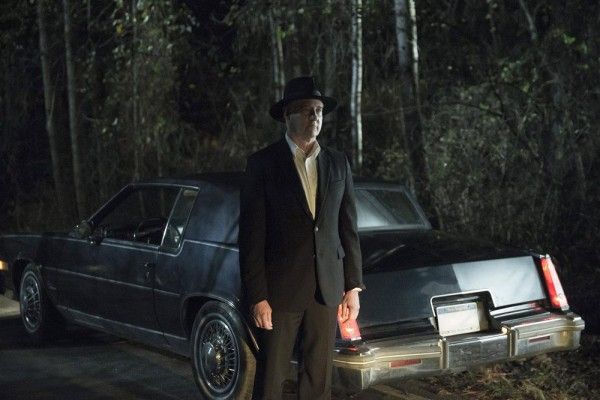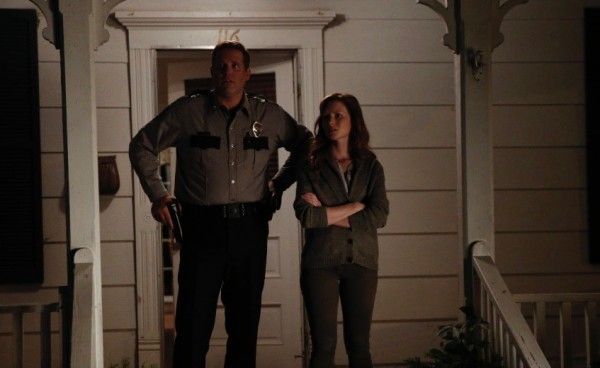Cinemax's Outcast opens in an almost identical way as Robert Kirkman and Paul Azaceta's graphic novels of the same name. A small family home in the fictional town of Rome, West Virginia is turned into a house of horrors by the demonic possession of a young boy, who is revealed to his mother by chewing off the flesh on his own finger for sustenance. It's an unsettling image in both instances, but there's at least one notable difference in the series. As the first season opens, the first image we see is that of a cockroach scurrying across the wall of the boy's room, right before he smashes the insect into a sticky puddle of guts.
One could dismiss this as simply another image to freak viewers out; people are not particularly fond of insects, especially roaches. It's that very notion, however, that Outcast looks to upend throughout its inaugural ten-episode run. Cockroaches are considered symbols of something horrible and disgusting, and yet they are just small, powerful animals who work to survive and had no input on how they look or are perceived. There's an illusion of evil and horror placed on roaches, and there's a similar reputation placed on Kyle Barnes (Patrick Fugit), the young father at the center of the series. Having survived a childhood with a possessed, abusive mother, Kyle is now dogged by an even more hard-to-shake event: the beating of his now-estranged wife, Allison (Kate Lyn Sheil).
Kirkman, who serves as creator and executive producer here, and Azaceta knew what they were doing. A wife-beater is about as universally despised a label as one can imagine; one would almost certainly rather be called a murderer or a thief. So, to ask a close-knit community like the one Kirkman, along with series directors and producers Howard Deutch and Adam Wingard, depicts to forgive such an act is a tall order. When we first meet Kyle, he refuses to leave his home due to the despair he feels over the act, despite knowing that demonic possession is to blame for Allison's violent outburst way back when. Not long into the series' pilot, Kyle is partnered with Reverend Anderson (Philip Glenister), and from there, this undervalued, exquisitely acted supernatural drama series becomes a radical treatise on the lost art of forgiveness, especially in the realm of Christianity where it's often talked about but rarely practiced.
The only person who still seemingly sees the good in Kyle is Megan (Wrenn Schmidt), his adoptive sister from the foster home where he was sent after his mother was exorcised and left catatonic. The relationship between Megan and Kyle is one of the more endearing and well-worn elements of the series, and their bond becomes all the more clear when we realize that Megan, herself, is a survivor of abuse and rape. One can see a similarity between Outcast's depiction of coping with abuse and that found in Jessica Jones, but where the superb Marvel property seems to chiefly highlight the good that lives on survivors, Outcast muddles the water more. Kyle and Megan are capable of tremendously empathetic acts, but they can't always follow through with them. The series doesn't excuse their bad acts just because they are inherently well-meaning, decent people. and that makes all the difference in depicting richly drawn and complex characters.
Megan's husband, Mark (David Denman), is one of the denizens of Rome that comes to change his mind about Kyle, and his transition highlights the show's almost instinctual sense of dramatic pacing. It's not until the last three episodes that Mark really trusts Kyle, but Megan's belief in her brother and Kyle's own selfless acts slowly draw the character out; Mark also has his own demons, particularly in reference to his temper and belief in violence. Even more remarkable than his change of mind, however, is Anderson's revelation of his truly humbling place in the world. The series subverts the classic possession-story totem that Christianity is the greatest weapon against possessive demons by seeing Anderson's doings - the cross, the holy water, etc. - as little more than irritants. The series features a little over a half-dozen possession sequences, each one more unsettling and surprising than the last, and with each encounter, Anderson becomes more certain that it's Kyle's inarticulated power to cast out the demons, which are seen as torrents of obsidian sludge, that is truly special.
In a way, Anderson is a far more interesting character than Kyle, in that he must grapple with being truly powerless. It's what makes the haunting outcome of the fire he sets at the end of the season finale, "This Little Light," all the more devastating. His anger at the devil, personified here by Brent Spiner's gleefully diabolical Sidney, clouds his judgement and his sense of empathy and forgiveness. The fire he sets is a desperate act of a man desperate to have a special place in God's eye. In comparison, Kyle must come to grips with the fact that he is unique in the eyes of the lord, and that he is indeed on a mission that will likely become clearer as Season 2 gets going in 2017.
Outcast ends up sharing more than a few strands of thematic DNA with Kirkman's other series, the juggernaut that is The Walking Dead. Both shows are about the hard work of keeping the faith, and how very little organized religion really has to do with such things. And both Outcast and The Walking Dead is intensely focused on how communities thrive and survive in an increasingly isolation-friendly atmosphere. Beyond the aforementioned, evocative cast members, the possession drama also features the great Reg E. Cathey as Chief of Police Giles and Melinda McGraw as a divorced single mother who is attempting to make a life with the Reverend. And Outcast shares The Walking Dead's greatest asset, which is that no character feels like a simple mechanism in the whirligig of the plot. Each one of these characters feels like people you would bump into at church or the supermarket, or start a quiet, heated affair with when no one else is looking.
Much like the comics, the show uses shadows to its advantage, and finds a remarkable variety of ways to utilize the darkness as an expressive reflection of the possessed. Unlike the comics, however, the show has a more potent wisdom to its depictions of small-town life, constantly ringing with the timbre of genuine experience and memory. The comics, though gorgeously drawn and written with both impulse and storytelling expertise, feel a bit beholden to the ultimate story of Outcast. Even when Anderson and Kyle are being quietly led into a secret interrogation of a possessed cop-turned-murderer, one can feel the pulse of wild, unbound life running under the plot and often loosening the story up to catch something remarkably human that's not in the script necessarily. It's in the way that Kyle puts his pants on when Megan rings his doorbell, or in the way Spiner realizes his character in physical touches - the way he walks, the way he prepares to work on a car engine, etc. This isn't to say that the show never has a dull moment, but even when the story plateaus for a stretch, Outcast feels effortlessly like a show about unpolished people, those who are confronted with a question that so many of us have seen before: do you forgive the perceived monster, or do you risk becoming a real one?


